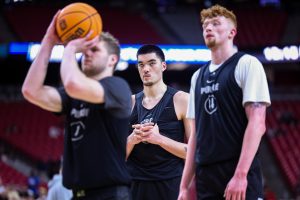- Slug: Sports-No NIL International Students, 860 words.
- 2 photos available.
- Video available.
By Anne-Marie Iemmolo
Cronkite News
PHOENIX – Beth Coulter was born and raised in Northern Ireland before moving to Arizona to play for Arizona State University’s women’s golf team. As one of her requirements on the Tempe campus as a Sun Devil athlete, Coulter had to attend mandatory name, image and likeness workshops to learn more about the ways young competitors like herself can market their personal brands to the public.
But there was just one problem – international college athletes like Coulter cannot receive money from NIL deals because of visa restrictions. Students choosing to study in the U.S. require F-1 visas, which allow them to study and live abroad but prevent them from participating in NIL deals.
“To sit there and think about the thousands of dollars that these American kids are earning. And we’re sitting there, and we can’t do anything, it’s a little bit frustrating,” said Coulter, who was the No. 7 recruit in Ireland and joined the Sun Devils team for its state-of-the-art facilities, the Valley’s warm weather and an abundance of opportunities.
In July 2021, the NCAA approved a policy that allows college athletes to monetize their NIL.
However, international students, including athletes, are only able to work a maximum of 20 hours a week on campus during their first academic year. These regulations are put in place due to immigration regulations and limited work opportunities. Any off-campus work, such as NIL deals, are prohibited. Between practices, competitions and studying, Coulter says she and other athletes cannot fit a part-time job into their schedules, limiting their ability to earn income while in school.
International athletes can accept and promote NIL deals in their home countries. Washington Mystics forward Aaliyah Edwards, who is from Kingston, Ontario and played women’s basketball at UConn, signed a brand deal with Adidas Canada in February 2024 during the final months of her collegiate career. However, she could not promote the deal while on U.S. soil without jeopardizing her student visa.
ASU athletic director Graham Rossini said the school continues to raise awareness regarding NIL deals and provide information to international athletes on how to profit from these opportunities in their home countries. Rossini explained the school is “trying to give them (international athletes) the same chance of success in the ways that they’re allowed to pursue it.”
During the 2024 Men’s Final Four in Glendale, former Purdue center and Memphis Grizzlies rookie Zach Edey made headlines for discussing his visa restrictions.
“I feel like I’m missing on a lot of money,” said Edey, who was born in Toronto, Canada but moved to the States to pursue his professional basketball career at IMG Academy before signing with Purdue in 2020.
While NIL opportunities are prohibited, foreign athletes are allowed to profit from “passive” engagements, such as merchandise sales or EA sports video game licensing agreements.
Edey made $800,000 of passive income by partnering with the Purdue Team Store to release special edition hockey jerseys with the 7-foot-4″ center’s name and number stitched on the back.
Meanwhile, athletes like Bronny James, former USC Trojans guard and recent Los Angeles Lakers draft pick, made an estimated $5.9 million in NIL deals, the highest of any active NCAA athlete during the 2023-24 season.
“I hope it changes for people in the future to come,” Edey said in April.
Victoria Jackson, a sports historian and clinical associate professor of history at ASU, notes the increase in international athletes attending and competing for American colleges. There are more than 25,000 international student-athletes across all three divisions, according to the NCAA.
“Some of our sports have a majority of international athletes across all division one,” Jackson said.
Tennis, ice hockey, and soccer are the Division I men’s sports with the largest number of international athletes, while tennis, ice hockey and golf feature the most international athletes for women’s teams. International students represent 63 percent of NCAA men’s tennis players and 62 percent of women’s tennis players.
Roi Ginat, a member of ASU’s men’s tennis team, was born in Kfar Saba, Israel. He says access to NIL deals would bring financial ease to his life abroad.
“It’s a very expensive sport (tennis) to fly all over the world and compete, and you pay for your own coach and hotels and food,” Ginat said.
Senator Pete Ricketts of Nebraska introduced a bill in October 2023 to Congress that would allow athletes to sign endorsement contracts for the commercial use of their NILs through their F1 visas and employment authorizations.
“We want to make sure that we are not disincentivizing talented young people who come to the United States,” Ricketts said to Cronkite News in June.
Since introducing the bill, Ricketts and Senator Richard Blumenthal of Connecticut have continued to call upon the Department of Homeland Security to provide a plan to help international students access NIL deals.
As politicians like Ricketts and Blumenthal aim to find a solution to visa restrictions for international athletes, Jackson predicts that coaches will continue to recruit globally and search for talent worldwide.
“The last thing we want to do is, end up in a situation where fewer international school athletes are coming to play college sports in the United States,” Jackson said.
For more stories from Cronkite News, visit cronkitenews.azpbs.org.

